-
ORIGINAL ARTICLE10-09-2023
Autocompaixão entre estudantes de enfermagem de uma Universidade Estadual da Indonésia durante a pandemia de COVID-19
Revista Brasileira de Enfermagem. 2023;76(4):e20220585
Abstract
ORIGINAL ARTICLEAutocompaixão entre estudantes de enfermagem de uma Universidade Estadual da Indonésia durante a pandemia de COVID-19
Revista Brasileira de Enfermagem. 2023;76(4):e20220585
DOI 10.1590/0034-7167-2022-0585
Views0See moreRESUMEN
Objetivo:
Determinar el nivel de autocompasión e investigar las relaciones entre las variables sociodemográficas y la autocompasión entre estudiantes de pregrado de enfermería en una universidad estatal de Indonesia durante la pandemia de COVID-19
Métodos:
Este estudio utilizó un diseño transversal. Las muestras se seleccionaron mediante una técnica de muestreo aleatorio estratificado proporcional (n=260). Los datos se recopilaron utilizando una versión indonesia de la Escala de Autocompasión, que consta de 6 subescalas: bondad propia, autocrítica, humanidad común, aislamiento, atención plena y sobre identificación. Los datos se analizaron mediante análisis univariado y bivariado.
Resultados:
El 60% de los estudiantes tenían autocompasión moderada. Los estudiantes puntuaron más alto en amabilidad consigo mismos (3,93±1,02) y sobre identificación (3,58±0,94), lo que indica que a menudo intentaban amarse a sí mismos cuando sentían dolor emocional y a menudo se dejaban llevar cuando sucedió algo perturbador. Posteriormente, se encontró una correlación significativa entre la edad y la autocompasión (p<0,05).
Conclusión:
La autocompasión entre los estudiantes de enfermería debe mejorarse por medio de intervenciones como la alfabetización de la compasión, el entrenamiento en atención plena y las técnicas experienciales basadas en la compasión.
-
ORIGINAL ARTICLE10-09-2023
Tradução e validação do Multidimensional Individual and Interpersonal Resilience Measure
Revista Brasileira de Enfermagem. 2023;76(4):e20220696
Abstract
ORIGINAL ARTICLETradução e validação do Multidimensional Individual and Interpersonal Resilience Measure
Revista Brasileira de Enfermagem. 2023;76(4):e20220696
DOI 10.1590/0034-7167-2022-0696
Views0See moreRESUMEN
Objetivo:
traducir, adaptar culturalmente y validar el Multidimensional Individual and Interpersonal Resilience Measure para el portugués brasileño.
Método:
después de la traducción inicial, la versión pre-final pasó por rigurosos procedimientos de adaptación cultural. Como resultado, la versión final adaptada fue sometida a un estudio de validez.
Resultados:
los procedimientos de adaptación proporcionaron equivalencia entre las versiones pre-final y original en términos semánticos, idiomáticos, experienciales y conceptuales. Un total de 187 ancianos fueron incluidos en el estudio de validez. El análisis factorial exploratorio (AFE) generó un modelo de cinco factores ((RMSEA = 0,030; TLI = 0,959; X = 151,590 p> 0,05). La versión final mostró adecuada consistencia (α de Cronbach = 0,705) y confiabilidad prueba-reprueba (ICC=0,835). No se encontró correlación estadísticamente significativa entre la resiliencia y las variables sociodemográficas y epidemiológicas evaluadas en este estudio.
Conclusión:
EMRII-BR es un instrumento válido y confiable para medir la resiliencia en ancianos brasileños.
-
ORIGINAL ARTICLE10-09-2023
Variabilidade glicêmica e mortalidade em unidades de terapia intensiva oncológicas
Revista Brasileira de Enfermagem. 2023;76(4):e20220812
Abstract
ORIGINAL ARTICLEVariabilidade glicêmica e mortalidade em unidades de terapia intensiva oncológicas
Revista Brasileira de Enfermagem. 2023;76(4):e20220812
DOI 10.1590/0034-7167-2022-0812
Views0See moreRESUMEN
Objetivo:
investigar la asociación entre la variabilidad glucémica y la mortalidad en pacientes ingresados en unidades de cuidados intensivos oncológicos.
Métodos:
Se llevó a cabo un estudio de cohorte retrospectivo utilizando una muestra de conveniencia de 30 historias clínicas de pacientes de ambos sexos mayores de 18 años. La variabilidad glucémica se midió utilizando la desviación estándar y la amplitud general. El análisis estadístico se realizó utilizando la curva ROC (receiver operating characteristic) y el área bajo la curva (AUC). El nivel de significancia (α) se estableció en un 5% con un intervalo de confianza (IC) del 95%.
Resultados:
El estudio incluyó a 14 pacientes masculinos (46,67%) con una edad media de 60±15 años. Se recopilaron un total de 1503 muestras de glucemia. El análisis AUC para la desviación estándar no mostró ningún resultado estadísticamente significativo (p = 0,966; IC del 95% = [0,283, 0,726]). Por el contrario, la amplitud general tuvo una asociación estadísticamente significativa con la mortalidad (p = 0,049; IC del 95% = [0,514, 0,916]).
Conclusiones:
Este estudio encontró que la variabilidad glucémica medida por la amplitud general está significativamente asociada con la mortalidad del paciente en unidades de cuidados intensivos oncológicos. Estos hallazgos sugieren que el monitoreo de la variabilidad glucémica puede ser un factor importante en el manejo de pacientes críticamente enfermos en unidades de cuidados intensivos oncológicos.
-
ORIGINAL ARTICLE10-09-2023
Self-compassion among Undergraduate Nursing Students at a State University in Indonesia during the COVID-19 Pandemic
Revista Brasileira de Enfermagem. 2023;76(4):e20220585
Abstract
ORIGINAL ARTICLESelf-compassion among Undergraduate Nursing Students at a State University in Indonesia during the COVID-19 Pandemic
Revista Brasileira de Enfermagem. 2023;76(4):e20220585
DOI 10.1590/0034-7167-2022-0585
Views0See moreABSTRACT
Objective:
To determine the level of self-compassion and investigate the relationships between sociodemographic variables and self-compassion among undergraduate nursing students at a state university in Indonesia during the COVID-19 Pandemic.
Methods:
This study used a cross-sectional design. Samples were selected using a proportionate stratified random sampling technique (n=260). Data were collected using an Indonesian version of the Self-compassion Scale, which consists of 6 subscales: self-kindness, self-judgment, common humanity, isolation, mindfulness, and overidentification. Data were analyzed using univariate and bivariate analysis.
Results:
60% of students had moderate self-compassion. Students scored the highest in self-kindness (3,93±1,02) and over-identification (3,58±0,94), indicating that they often tried to love themselves when they felt emotional pain and often get carried away when something upsetting happened. Subsequently, a significant correlation was found between age and self-compassion (p<0.05).
Conclusion:
Self-compassion among nursing students should be improved through interventions such as compassion literacy, mindfulness training, and compassion-based experiential techniques.
-
ORIGINAL ARTICLE10-09-2023
Eating habits: what foods do children between 12 and 36 months consume?
Revista Brasileira de Enfermagem. 2023;76(4):e20220393
Abstract
ORIGINAL ARTICLEEating habits: what foods do children between 12 and 36 months consume?
Revista Brasileira de Enfermagem. 2023;76(4):e20220393
DOI 10.1590/0034-7167-2022-0393
Views0See moreABSTRACT
Objective:
to identify toddlers’ eating habits.
Method:
a cross-sectional study of quantitative analysis, with a sample of 808 toddlers who attended day care centers in the district of Viseu, Portugal, between November 2018 and September 2019. Data were collected using a questionnaire directed at parents.
Results:
the prevalence of children who ate six meals a day was 42.8%, and 42.5%, those who ate five meals. It was found that 2.0% of children consumed chocolates, 1.0%, desserts, and 0.4%, carbonated beverages, daily. On average, dairy product (M=5.61; SD=2.62) and meat/fish/egg (M=4.80; SD=3.57) consumption was higher than recommended, while fat (M=0.48; SD=0.40), legume (M=0.49; SD=0.45), vegetable (M=1.18; SD=0.87) and water (M=0 .51; SD=0.29) consumption was lower.
Conclusions:
there was a higher or lower consumption than recommended for some foods, highlighting the need to implement nursing intervention programs aimed at promoting healthy eating habits in toddlers and families.
-
ORIGINAL ARTICLE10-09-2023
A qualitative study of the reasons for low patient safety incident reporting among Indonesian nurses
Revista Brasileira de Enfermagem. 2023;76(4):e20220583
Abstract
ORIGINAL ARTICLEA qualitative study of the reasons for low patient safety incident reporting among Indonesian nurses
Revista Brasileira de Enfermagem. 2023;76(4):e20220583
DOI 10.1590/0034-7167-2022-0583
Views0See moreABSTRACT
Objectives:
to investigate the reasons for low patient safety incident reporting among Indonesian nurses.
Methods:
this qualitative case study was conducted among 15 clinical nurses selected purposively from a public hospital in Lampung, Indonesia. Interview guidelines were used for data collection through face-to-face in-depth interviews in July 2022. The thematic approach was used to analyze the data.
Results:
in this present study, seven themes emerged (1) Understanding incident reporting; (2) The culture; (3) Consequences of reporting; (4) Socialization and training; (5) Facilities; (6) Feedback; and (7) Rewards and punishments.
Final Considerations:
these findings should be considered challenges for the patient safety committee and hospital management to increase patient safety incident reporting, particularly among nurses in the hospital.
-
ORIGINAL ARTICLE10-09-2023
Prevalence of non-communicable chronic diseases: arterial hypertension, diabetes mellitus, and associated risk factors in long-lived elderly people
Revista Brasileira de Enfermagem. 2023;76(4):e20220592
Abstract
ORIGINAL ARTICLEPrevalence of non-communicable chronic diseases: arterial hypertension, diabetes mellitus, and associated risk factors in long-lived elderly people
Revista Brasileira de Enfermagem. 2023;76(4):e20220592
DOI 10.1590/0034-7167-2022-0592
Views0See moreABSTRACT
Objective:
To identify the prevalence of non-communicable chronic diseases: arterial hypertension, diabetes mellitus, and associated risk factors in long-lived elderly people from three Brazilian regions.
Methods:
This is a multicenter, cross-sectional, and comparative study conducted with elderly people aged 80 years or older.
Results:
Higher prevalence of arterial hypertension were observed among those who use polypharmacy (75.7%), among elderly people aged between 80 and 84 years (33.9%), as well as in elderly people who are overweight (78.2%). The prevalence of diabetes was 24% (RP: 0.76; 95% CI: 0.59-0.98) lower among women compared to men and 2.15 times higher among those who use five or more medications (RP: 2.15; 95% CI: 1.63-2.85).
Conclusions:
In our sample, polypharmacy, body weight, and gender determine the prevalence of non-communicable chronic diseases: arterial hypertension and diabetes mellitus in long-lived elderly people.
-
ORIGINAL ARTICLE09-24-2022
Nurses’ performance in palliative care: spiritual care in the light of Theory of Human Caring
Revista Brasileira de Enfermagem. 2022;75(1):e20210029
Abstract
ORIGINAL ARTICLENurses’ performance in palliative care: spiritual care in the light of Theory of Human Caring
Revista Brasileira de Enfermagem. 2022;75(1):e20210029
DOI 10.1590/0034-7167-2021-0029
Views1See moreABSTRACT
Objectives:
to analyze nurses’ role in assisting patients in palliative care, with emphasis on the spiritual dimension, in the light of Theory of Human Caring.
Methods:
this is an exploratory, qualitative study, carried out in a hospital in João Pessoa, Paraíba, between August and December 2019, with 10 nurses. For data collection, semi-structured interviews were used. For analysis, we opted for content analysis.
Results:
the spiritual dimension of care is contemplated by several religious and spiritual practices. These are respected and encouraged by nurses, although there is difficulty in providing care for the spiritual dimension.
Final Considerations:
nurses have attitudes consistent with Jean Watson’s Theory and apply the Caritas Process elements during assistance to patients’ spiritual dimension in palliative care.
-
ERRATUM01-15-2024
ERRATUM
Revista Brasileira de Enfermagem. 2024;77(1):e2024n1e01
Abstract
ERRATUMERRATUM
Revista Brasileira de Enfermagem. 2024;77(1):e2024n1e01
DOI 10.1590/0034-7167.20247701e01
Views1In the article “The ethics of nursing care for transgender people”, with DOI number: , published in Revista Brasileira de Enfermagem, 2023;76(Suppl 3):e20220797, in authorship:Where it read:[…]See more -
ORIGINAL ARTICLE04-14-2023
Guide for Systematization of Care and Nursing Process: educational technology for professional practice
Revista Brasileira de Enfermagem. 2023;76:e20210975
Abstract
ORIGINAL ARTICLEGuide for Systematization of Care and Nursing Process: educational technology for professional practice
Revista Brasileira de Enfermagem. 2023;76:e20210975
DOI 10.1590/0034-7167-2021-0975
Views1ABSTRACT
Objective:
to elaborate and validate the content of a digital guide educational technology on Systematization of Nursing Care and Nursing Process.
Methods:
applied research of technological development, developed between 2020 and 2021, in three steps. First, a scoping review was carried out to elaborate the content. In the second step, the content was validated with 46 nurse judges selected for convenience. The minimum criterion of agreement among judges was 80%. The third step consisted of content organization and layout.
Results:
the guide content was elaborated from the Federal Nursing Council legislation, scientific articles and textbooks. Content was considered appropriate, relevant and organized by judges.
Final considerations:
the digital guide is an alternative that can contribute to the NP execution and implementation, supporting the planning and implementation of actions for quality of care.
Keywords:Educational TechnologyNursing ProcessNursing RecordsProfessional PracticeStandardized Nursing TerminologySee more
-
ORIGINAL ARTICLE03-27-2023
Adaptation and validation of an adult patient classification instrument with emphasis on the family dimension
Revista Brasileira de Enfermagem. 2023;76(2):e20220530
Abstract
ORIGINAL ARTICLEAdaptation and validation of an adult patient classification instrument with emphasis on the family dimension
Revista Brasileira de Enfermagem. 2023;76(2):e20220530
DOI 10.1590/0034-7167-2022-0530
Views1ABSTRACT
Objectives:
to adapt and validate an instrument for classifying adult patients that emphasizes the family support network in the demand for nursing care.
Methods:
methodological study, carried out in three phases: adaptation of an instrument considering the reality of adult patients; content validation with seven experts and assessment of measurement properties (construct validity and internal consistency) with 781 hospitalized patients.
Results:
in content validation, the indicators reached the values established for the Content Validity Index (0.85-1.00). In the confirmatory factor analysis, the 11 indicators were distributed in three domains and presented average variance extracted and factor loading greater than 0.5. Composite reliability was greater than 0.7.
Conclusions:
the present study adapted and made available, with evidence of validity and reliability, an instrument for classifying adult patients that considers the family support network in the demand for nursing care.
Keywords:Factor AnalysisFamilyHospital Organization and AdministrationPatient-Centered CareValidation StudiesSee more
-
ORIGINAL ARTICLE10-17-2022
Ethics, COVID-19 and nursing vulnerability: analysis of photographs released by the media
Revista Brasileira de Enfermagem. 2022;75:e20210960
Abstract
ORIGINAL ARTICLEEthics, COVID-19 and nursing vulnerability: analysis of photographs released by the media
Revista Brasileira de Enfermagem. 2022;75:e20210960
DOI 10.1590/0034-7167-2021-0960
Views1See moreABSTRACT
Objectives:
to analyze nursing vulnerability through photos released by the media amidst the COVID-19 pandemic.
Methods:
a documentary study, with a qualitative approach. The object of analysis were photographic images selected between January 2020 and March 2021, published by the main news portals in countries such as Brazil, the United States, France, Spain, England and Germany. Thematic categorical analysis was the method of analysis used.
Results:
we found 74 photographs that portrayed nursing professionals in different work situations. It was possible to identify stigma and social devaluation about this class’s representation and professional attribution. Moreover, we found an underrepresentation of black professionals in Brazilian portals and the man as the prominent figure in the spaces of claims.
Final Considerations:
the photographs represented an important tool for the social analysis of nursing vulnerability, favoring the unveiling of situations that may go unnoticed by nursing and society.
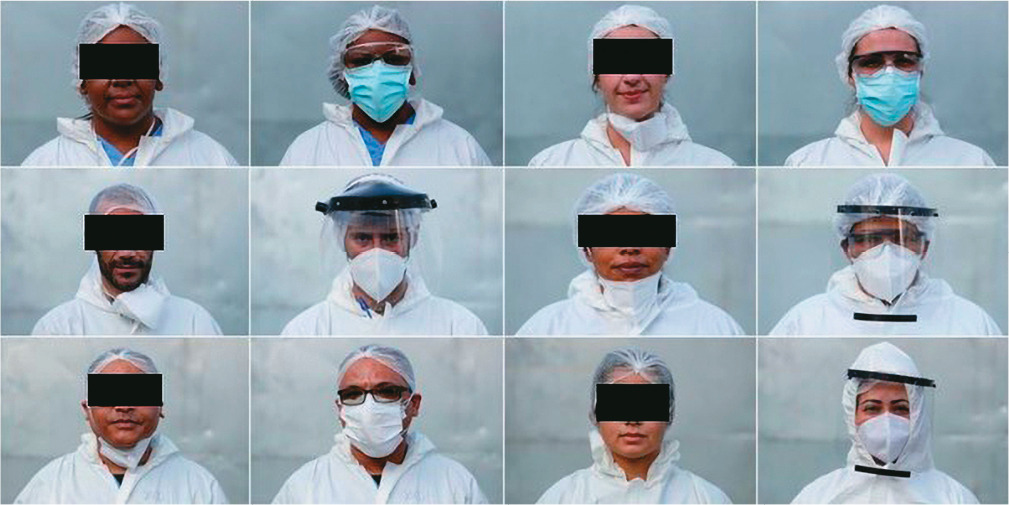
-
TECHNOLOGICAL INNOVATION09-01-2021
Nursing APHMÓVEL: mobile application to register the nursing process in prehospital emergency care
Revista Brasileira de Enfermagem. 2021;74:e20201029
Abstract
TECHNOLOGICAL INNOVATIONNursing APHMÓVEL: mobile application to register the nursing process in prehospital emergency care
Revista Brasileira de Enfermagem. 2021;74:e20201029
DOI 10.1590/0034-7167-2020-1029
Views1ABSTRACT
Objectives:
to develop an application for a mobile device for the registration of the Nursing Process by nurses of the Mobile Emergency Care Service.
Methods:
applied research with technology development based on software engineering and Apple’s Human Interface Guidelines. It had the support of an application developer and a designer. The proposal was built in four steps (scope definition, planning, prototype creation and development).
Results:
the application “Nursing APHMóvel” allows to record the steps of the Nursing Process, such as history, nursing diagnoses, outcomes and interventions with the possibility of storing the data and/or file in printable format. The technological innovation has location features, scales with automatic sum of items, touchscreen, and offline operation.
Conclusions:
it was possible to develop the application with the potential for computerized documentation of the Nursing Process by nurses working in the Mobile Emergency Care Service.
Keywords:Electronic Health RecordsInformation TechnologyMobile ApplicationsNursing ProcessPrehospital CareSee more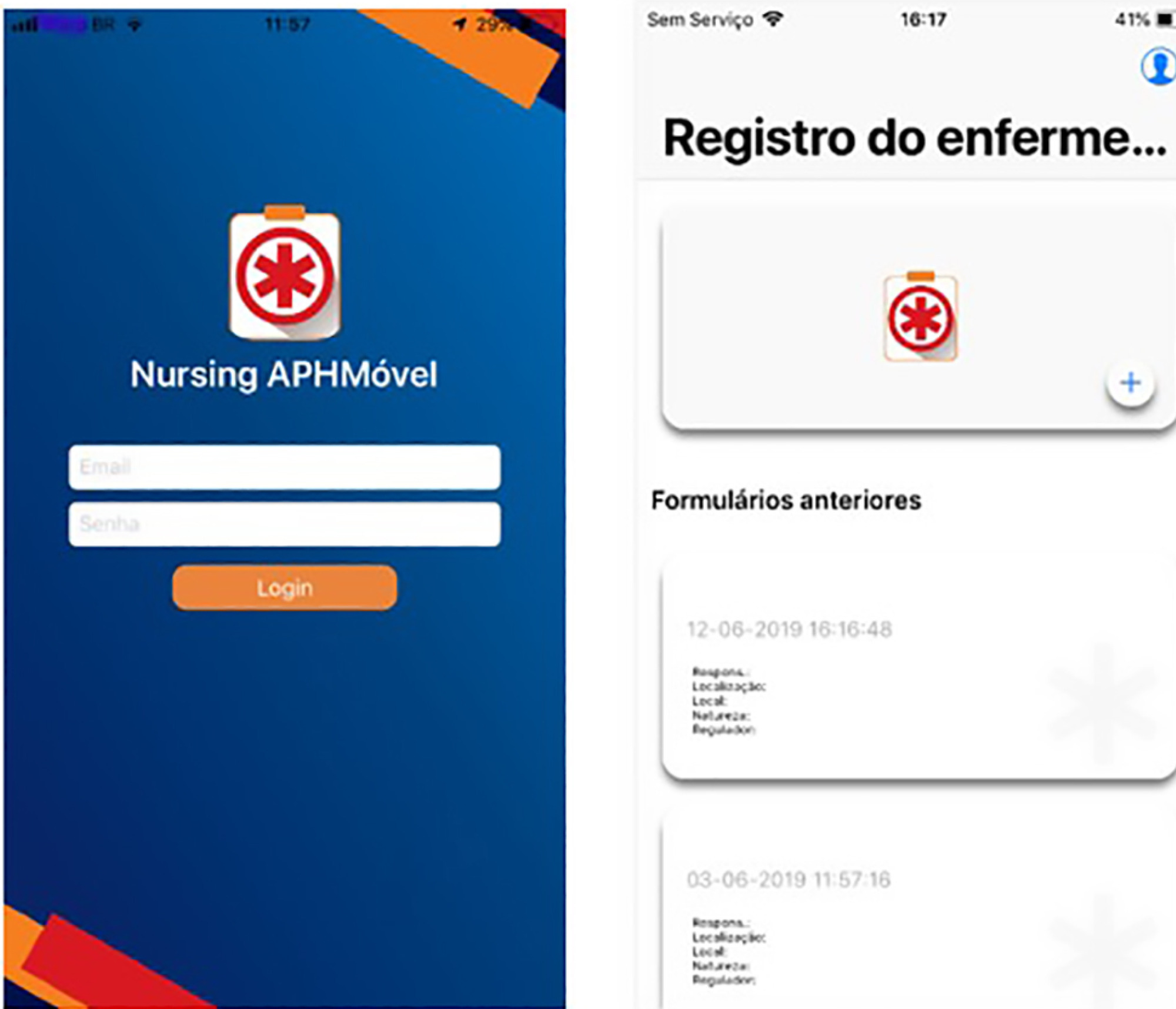
-
Evolution of nursing teaching in the use of education technology: a scoping review
Revista Brasileira de Enfermagem. 2021;74:e20200422
Abstract
Evolution of nursing teaching in the use of education technology: a scoping review
Revista Brasileira de Enfermagem. 2021;74:e20200422
DOI 10.1590/0034-7167-2020-0422
Views1See moreABSTRACT
Objective:
To identify and map the technological tools of information and communication to support the teaching learning process in Nursing teaching courses.
Methods:
This is a scoping review whose search was carried out in seven databases and in grey literature. After an initial analysis of the selection, 88 texts were read integrally, and 29 made up the final sample.
Results:
Virtual learning environment and object, simulation, hypermedia, and software or cellphone applications were the tools the nursing professors used the most. Studies highlight that the application of technology was important in the teaching-learning process, since it encouraged teaching based on safe care, motivating and developing abilities/competences, supported on significant, effective, flexible, and autonomous learning.
Conclusion:
The contribution of the technology for nursing formation stands out, but it should be highlighted that its employment must be critical, reflective, based on pedagogical theories and developed by trained professors.

-
ORIGINAL ARTICLE06-14-2024
Validity of the TBApp mobile application for self-care management for people with tuberculosis
Revista Brasileira de Enfermagem. 2024;77(2):e20230195
Abstract
ORIGINAL ARTICLEValidity of the TBApp mobile application for self-care management for people with tuberculosis
Revista Brasileira de Enfermagem. 2024;77(2):e20230195
DOI 10.1590/0034-7167-2023-0195
Views1See moreABSTRACT
Objectives:
to describe the validity process of the TBApp mobile application for self-care management for people with tuberculosis linked to Primary Health Care.
Methods:
methodological research developed with ten expert judges, carried out virtually. The application was assessed in relation to content and technology quality in seven domains (objectivity; structure and appearance; relevance; functionality; reliability; usability; and efficiency), using an instrument with a Likert scale.
Results:
TBApp was considered valid, relevant, functional, reliable and effective by expert judges. The objectives, structure and presentation and relevance domains presented an overall Content Validity Index of 0.93, and the functionality, reliability, usability and efficiency domains presented characteristics and sub-characteristics values greater than 0.80.
Conclusions:
TBApp is a creative and innovative tool that can be used by people with TB and disseminated in the scientific community.
-
ORIGINAL ARTICLE12-07-2020
Sarcopenia screening in elderly in primary health care: nurse knowledge and practices
Revista Brasileira de Enfermagem. 2020;73:e20200421
Abstract
ORIGINAL ARTICLESarcopenia screening in elderly in primary health care: nurse knowledge and practices
Revista Brasileira de Enfermagem. 2020;73:e20200421
DOI 10.1590/0034-7167-2020-0421
Views0See moreABSTRACT
Objective:
Describe the knowledge and practices of the Primary Health Care nurse on sarcopenia screening in the elderly.
Methods:
Qualitative study conducted with 24 Primary Health Care nurses. The data was collected through semi-structured interviews, recorded and later transcribed. The speeches were grouped in thematic categories, later analyzed, supported by Paulo Freire’s reference.
Results:
The findings showed that the primary care nurses’ knowledge of sarcopenia screening in the elderly was incipient and fragile. This reality is reflected in a gap in practice, although some instruments already require the registration of characteristics indicative of sarcopenia, such as the evaluation of the calf circumference.
Final Considerations:
The need to train nurses to perform sarcopenia screening and to implement a promotional and preventive care plan, which will result in improving the quality of life of the elderly assisted in Primary Care, was highlighted.
-
ORIGINAL ARTICLE03-30-2020
Stomized children care practices: narratives of relatives
Revista Brasileira de Enfermagem. 2020;73(2):e20180370
Abstract
ORIGINAL ARTICLEStomized children care practices: narratives of relatives
Revista Brasileira de Enfermagem. 2020;73(2):e20180370
DOI 10.1590/0034-7167-2018-0370
Views0See moreABSTRACT
Objectives:
to understand the practices adopted by relatives regarding ostomized children care.
Methods:
qualitative approach, conducted with 11 relatives of ostomized children. Methodological framework was used as narrative technique; NVivo® software for data categorization and information analysis; content analysis technique.
Results:
participants revealed unpreparedness in dealing with children, lack of knowledge about handling materials and equipment inherent to ostomy and challenges faced in the daily life of children in school. They are unanimous in telling they feel encouraged and strengthened by receiving support from nurses in child care. They suggested the development of strategies to guide ostomized children care, such as educational material use.
Conclusions:
to understand family members’ experience made it possible to support training and qualification of nursing professionals, and to establish priorities in care. Evidence found may contribute to reflections that aid health promotion and prevention of complications in ostomized children care.
-
ORIGINAL ARTICLE03-30-2020
Parental care for infants with feeding tube: psychosocial repercussions
Revista Brasileira de Enfermagem. 2020;73(2):e20180360
Abstract
ORIGINAL ARTICLEParental care for infants with feeding tube: psychosocial repercussions
Revista Brasileira de Enfermagem. 2020;73(2):e20180360
DOI 10.1590/0034-7167-2018-0360
Views0See moreABSTRACT
Objectives:
to understand the psychosocial repercussions experienced by caregiving parents, resulting from care for the child with dysphagic cleft lip and palate.
Methods:
qualitative study, developed in a tertiary hospital in September 2016. The sample defined by theoretical saturation consisted of seven mothers. Data collection was performed by unstructured interview, being audio-recorded and fully transcribed. Symbolic Interactionism was used as theoretical framework, and Thematic Content Analysis as methodological framework.
Results:
the following themes emerged: diagnosisimpact and coping; coping with overload and stress; interaction between caregivers as an acceptance and coping strategy; impact on family and social life of caregivers; and curiosity coping, and family and community prejudice.
Final considerations:
despite the physical and emotional overload, the mother figure plays the main and determining role in care, reflecting the complexity of care.
-
Institutional strategies to prevent violence in nursing work: an integrative review
Revista Brasileira de Enfermagem. 2019;72(4):1052-1060
Abstract
Institutional strategies to prevent violence in nursing work: an integrative review
Revista Brasileira de Enfermagem. 2019;72(4):1052-1060
DOI 10.1590/0034-7167-2018-0687
Views0See moreABSTRACT
Objective:
To analyze the production of research that adopted as object of investigation: institutional strategies, actions and programs to curb and/or prevent the nursing workplace violence.
Method:
Integrative review of 14 articles in full, available in the databases LILACS, PubMed Central, Scopus, CINAHL and Web of Science.
Results:
Of the articles analyzed, most arise from quantitative research (71%), carried out in the United States (65%), with educational actions (57%) and programs (43%), denoting policies.
Conclusion:
Results showed various ways to curb or prevent nursing workplace violence. These are specific strategies, there are few programs deployed worldwide, usually centered in the United States, Canada and Sweden. Most of them is well evaluated and can serve as a model for the development and dissemination of policies according to the needs of each location.
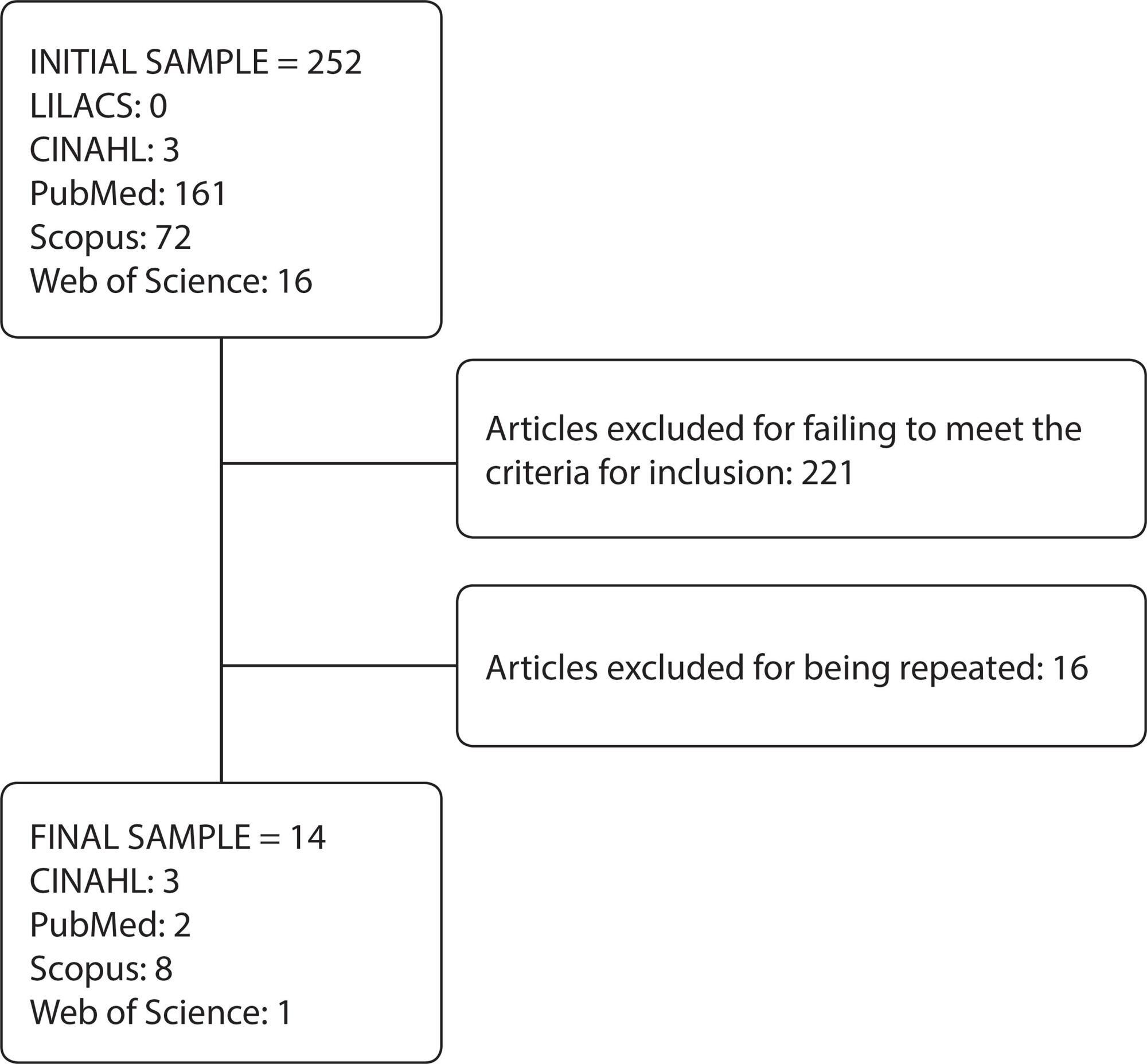
-
Professional education on dementias in Primary Health Care: an integrative review
Revista Brasileira de Enfermagem. 2019;72(4):1086-1093
Abstract
Professional education on dementias in Primary Health Care: an integrative review
Revista Brasileira de Enfermagem. 2019;72(4):1086-1093
DOI 10.1590/0034-7167-2018-0652
Views0See moreABSTRACT
Objective:
To investigate the most commonly used educational approaches in dementia training for primary health care professionals.
Method:
Integrative literature review, conducted between April and June of 2018, in PubMed, LILACS and IBECS databases. The descriptors used were: Training, Health Personnel, Dementia, Primary Health Care for PubMed; and the MeSH terms, Training Programs, Health Personnel, Dementia, and Primary Health Care for LILACS and IBECS.
Results:
The sample consisted of 13 articles; eight were published in the last five years (62%); seven articles with a quantitative approach (54%); seven articles produced on the European continent (54%), followed by five published on the North American continent (38%). All journals were from the health area (100%).
Conclusion:
Educational strategies were combined and used for education. Significant improvements in knowledge, skills, and attitudes of the teams with regard to professional management of dementias were evidenced.

-
ORIGINAL ARTICLE12-16-2023
School Nursing Guide for student health promotion: construction and validity
Revista Brasileira de Enfermagem. 2023;76(1):e20220260
Abstract
ORIGINAL ARTICLESchool Nursing Guide for student health promotion: construction and validity
Revista Brasileira de Enfermagem. 2023;76(1):e20220260
DOI 10.1590/0034-7167-2022-0260
Views0See moreABSTRACT
Objectives:
to describe the process of construction and validity of a School Nursing Guide for student health promotion.
Methods:
a methodological study, carried out from February to December 2021, composed of Convergent Care Research based on Pender’s Health Promotion Model. Based on the literature and dialogue with 11 nurses in the seven online focus groups, actions were constructed. Subsequently, 24 judges assessed content and appearance.
Results:
the guide proposes strategies for developing school nursing practices focusing on health promotion. The Appearance Validity Index ranged from 0.63 to 1.0, and the total was 0.84. The Content Validity Index ranged from 0.95 to 1.0, and the total was 0.997.
Conclusions:
the guide incorporated the needs of young people recognized by professionals, and the assessment phase confirms its validity, and can be used in the context of practice with young people.
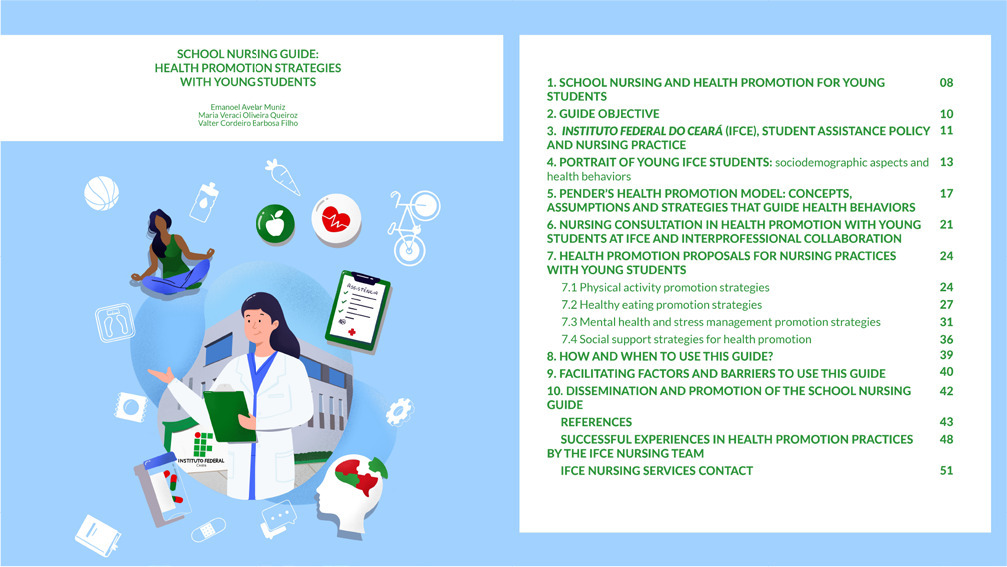
-
REVIEW07-10-2020
Acute Kidney Injury by SARS-CoV-2 virus in patients with COVID-19: an integrative review
Revista Brasileira de Enfermagem. 2020;73:e20200354
Abstract
REVIEWAcute Kidney Injury by SARS-CoV-2 virus in patients with COVID-19: an integrative review
Revista Brasileira de Enfermagem. 2020;73:e20200354
DOI 10.1590/0034-7167-2020-0354
Views0See moreABSTRACT
Objective:
to assess scientific evidence on SARS-CoV-2 Acute Kidney Injury in patients with COVID-19.
Methods:
an integrative review, with adoption of PICO strategy and classification of the level of evidence, carried out on April 10, 2020 in the PubMed database, of articles available between December 2019 and April 2020.
Results:
the sample consisted of six original, five observational and one experimental articles. Observational studies addressed the clinical findings of patients with COVID-19 and association between kidney damage, infection, and morbidity-mortality.
Conclusion:
the studies addressed the mechanism of intracellular infection of SARS-CoV-2, its cytopathic effects on kidney cells and incidence of acute kidney injury in patients infected with SARS-CoV-2. Acute kidney injury is associated with increased mortality and morbidity in these patients. This review realizes the need for new research that can mention kidney care to patients with COVID-19.
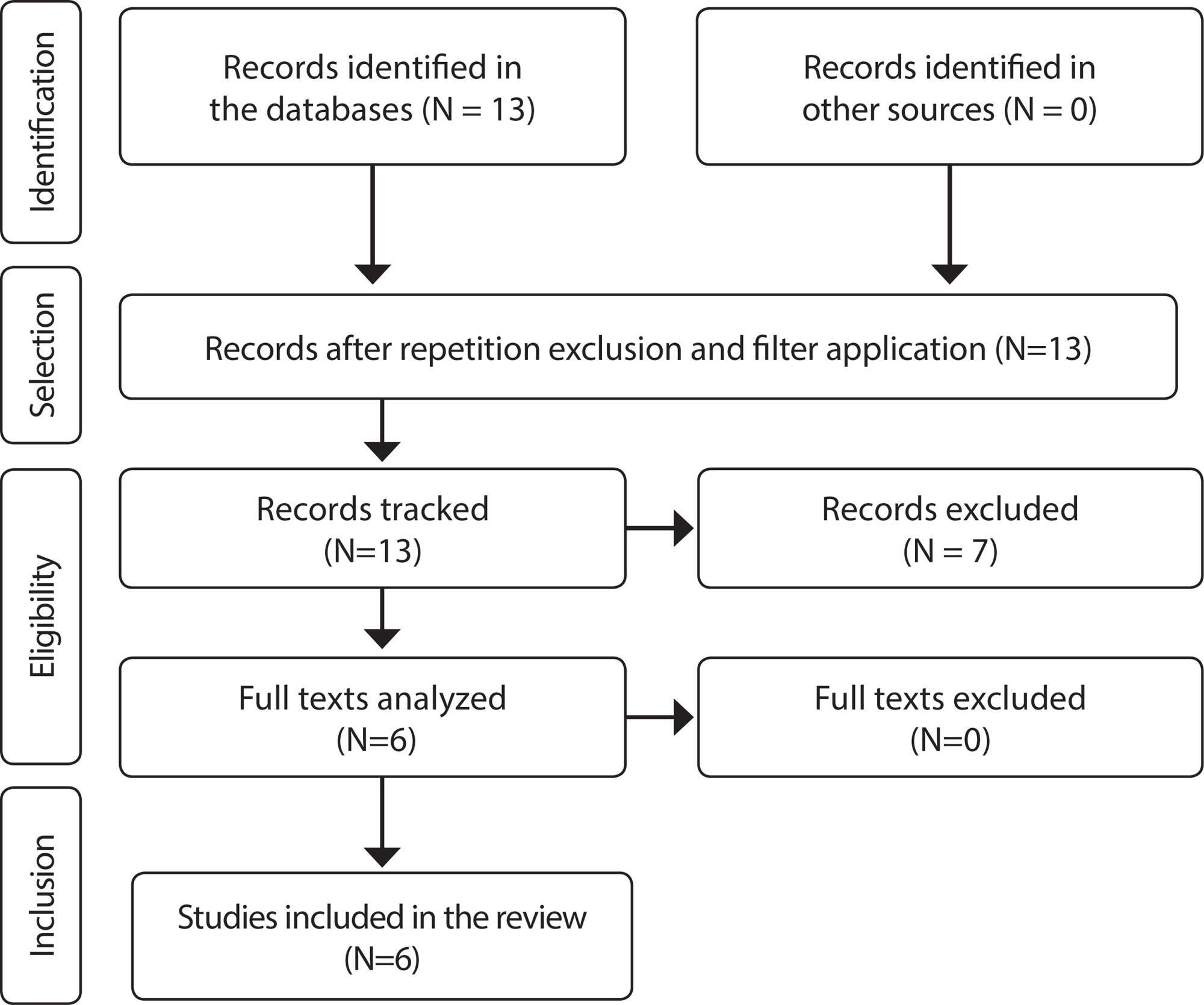
-
REVIEW07-14-2021
Complications, clinical manifestations of congenital syphilis, and aspects related to its prevention: an integrative review
Revista Brasileira de Enfermagem. 2021;74(4):e20190318
Abstract
REVIEWComplications, clinical manifestations of congenital syphilis, and aspects related to its prevention: an integrative review
Revista Brasileira de Enfermagem. 2021;74(4):e20190318
DOI 10.1590/0034-7167-2019-0318
Views0See moreABSTRACT
Objectives:
to identify the scientific evidence about the clinical complications and manifestations of congenital syphilis and aspects related to its prevention.
Methods:
integrative review after a search in the databases LILACS and MEDLINE, carried out in March 2018, using the descriptors “syphilis, congenital”, “complications”, and “signs and symptoms”, leading to the selection of 27 researches.
Results:
the publications found were published from 1966 to 2017, and most of them were from Latin America and Africa. Negative outcomes, laboratory changes, and the clinical manifestations in congenital syphilis, whether early or delayed, were, respectively: low weight at birth, anemia, hepatosplenomegaly, and dental alterations. The lack of treatment of the pregnant women in the prenatal was the most common occasion in which the opportunity to prevent the complications of congenital syphilis was lost.
Conclusions:
the scientific evidences analyzed showed serious complications of congenital syphilis that could be avoided if early opportunities of diagnosing and treating the pregnant women are not lost during the prenatal.
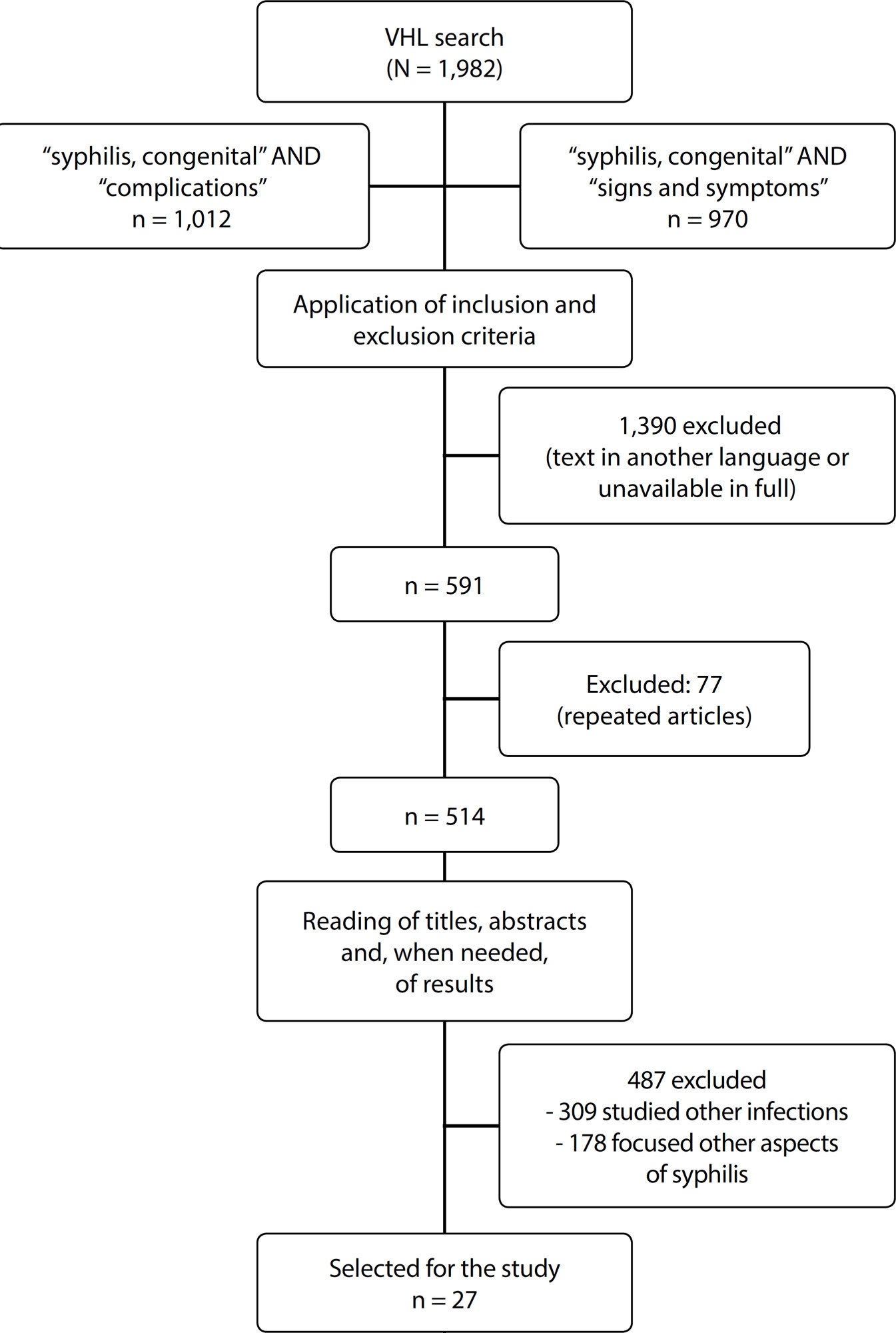
Search
Search in:
Nuvem de Tags
Aged (144) Atenção Primária à Saúde (239) COVID-19 (104) Cuidados de Enfermagem (269) Educação em Enfermagem (151) Educação em Saúde (139) Enfermagem (930) Estudos de Validação (131) Health Education (144) Idoso (208) Mental Health (149) Nursing (987) Nursing Care (306) Patient Safety (151) Primary Health Care (284) Qualidade de Vida (104) Quality of Life (106) Saúde Mental (145) Segurança do Paciente (150) Validation Studies (108)



